Jo Johnson quits: When Britain’s political families don’t see eye-to-eye
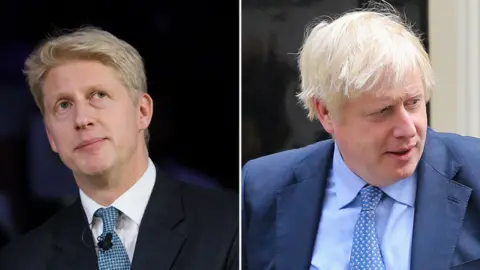 Getty Images
Getty ImagesJo Johnson said he made the decision to quit his brother Boris Johnson's government and stand down as an MP after being "torn between family loyalty and the national interest".
But the brothers are far from the first relatives on the frontline of politics to disagree.
Siblings, even parents, have represented differing views in British politics - but it's not always fractious.
Ed and David Miliband
Ed and David Miliband had risen through the ranks of the then-Labour government to seats at the Cabinet table and were seen as the party's future.
David was Foreign Secretary and Ed was Secretary of State for Energy and Climate Change when Labour lost power in May 2010.
In the subsequent party leadership election that year, both siblings decided to run - with newspapers breathlessly reporting their rival bids.
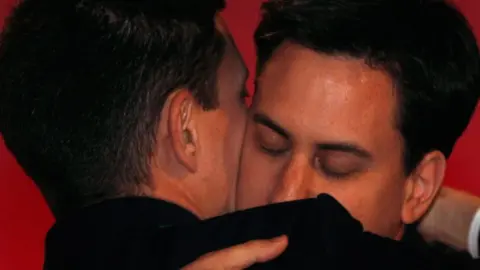 Getty Images
Getty ImagesTim Bale, a professor of politics at Queen Mary University who has studied Ed Miliband's time as Labour leader, told the BBC it has been suggested the pair's relationship never fully recovered from the race.
"On the personal level, by all accounts, the relationship between the two brothers and their respective families took quite a knock", he says.
And there were political repercussions as well. "Ed was never able to shake off the accusation that he had somehow done something wrong or was just weird in taking on and beating his older brother," Prof Bale adds.
"If focus groups are representative of anything, it cut through to voters, too. No-one would say that this cost Labour the 2015 election but it probably didn't help matters."
Stanley and Oliver Baldwin
But close family members having different political views at the very heart of British politics has not always made headlines.
Stanley Baldwin, Tory PM in the 1920s and 30s, led the government whilst his son, Oliver, bid to become a Labour MP. The pair went on to sit opposite each other in the Commons after Labour's win in 1929.
Steven Fielding, professor of political history at University of Nottingham, told the BBC that the relative lack of media interest in the division between father and son would be unimaginable now.
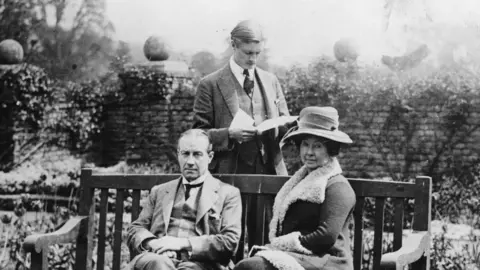 Getty Images
Getty ImagesWhile it was hardly a secret at the time, Prof Fielding says the interwar years were a time "when neither journalists nor the public pried into family business".
"In the early days, if there was any dispute between family members, it wasn't made very much of, the media didn't exploit it and it wasn't politicised or made into a character issue," he says.
Prof Fielding cites the Profumo Affair, which engulfed the government in 1963, as a watershed in how the media explored the private lives of politicians.
"We're in this era now where family feuds are politicised and previously if and where these feuds existed they were handled very differently," he says.
"We know far more about the person of the politicians, who they are married to, their children. The focus of the media on personalities not because of their politics but perhaps because of what jam they like."
Hilary and Tony Benn
Unlike the Baldwins, Hilary Benn and his father Tony were members of the same party.
While Hilary Benn had been a rising star as a special advisor within Tony Blair's government, Tony Benn later said disparagingly that New Labour turned the party into a "quasi-Thatcherite sect".
Yet there was little evidence of animosity between the pair. When his son was selected to run for the seat of Leeds Central in 1999, Mr Benn said: "He's his own man, he's very hard-working, very well respected."
They would sit alongside each other in parliament for two years before Tony Benn stood down in 2001.
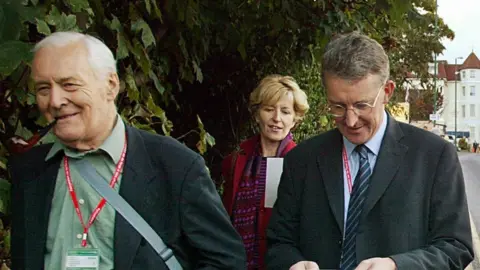 Getty Images
Getty ImagesTony Benn would go on to back his son's bid to become Labour deputy leader in 2007.
"If you are the son or the daughter of a leading politician there are obviously potential advantages," Prof Fielding says.
He adds that both Hilary Benn and Emily Benn, Tony Benn's granddaughter, are "constantly attacked" for their views by people who bring up their family connections.
In 2015, the former Scottish National Party leader, Alex Salmond, said Tony Benn would be "turning in his grave" after Hilary Benn called for air strikes in Syria.
"So that's a disadvantage, but it shows how people think," Prof Fielding says. "Why should the son or granddaughter have the same view? Why should politics be something that is transferred through your genes?"
'Through thick and thin'
Having a relative in parliament does not always mean division is on the cards.
Twins and Labour MPs Angela and Maria Eagle occupy much the same space within the party and, despite the potential for corrosive rivalry, have been known to consent to joint interviews, which note their camaraderie and similar laugh.
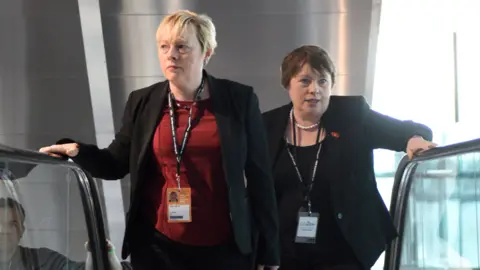 Getty Images
Getty ImagesSpeaking to The Times in 2010, the pair remarked how close they were. "I've known her so long I can violently disagree and it doesn't matter," Angela said.
And mother and son Ann and John Cryer worked alongside each other on the Labour benches after being elected at the same time.
Ann Cryer represented Keighley, West Yorkshire, until 2010, while John now represents Leyton and Wanstead after losing his Hornchurch seat in 2005.
Speaking at the time they were both elected in 1997, John Cryer said: "I telephoned my mother and we congratulated each other."
"Our view," he added, "is that if you have strong principles you keep hold of them through thick and thin."
Tim Bale reflects on how unusual it is for siblings, like Ed and David Miliband, or Jo and Boris Johnson, to go into politics in a similar way.
"It's actually incredibly unusual to see brothers and sisters both involved in politics - perhaps because they like to differentiate themselves from each other," he says.
"How many people do you know who do the exact same job as their brother or sister?"
